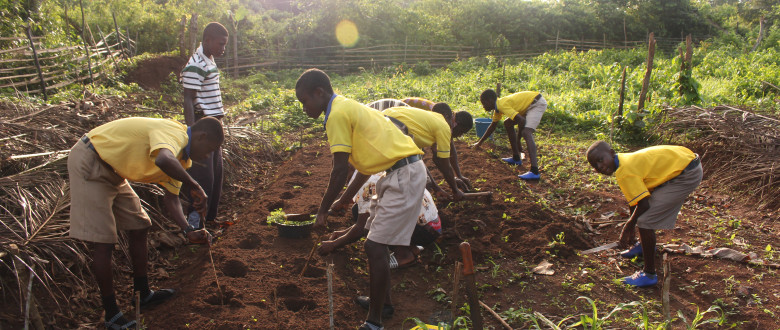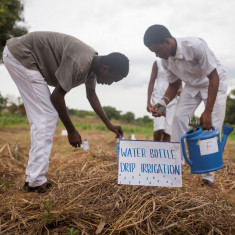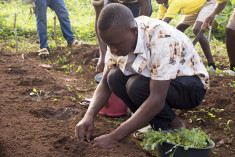
With over 1.2 billion people aged 15-24 in the world today, youth are the largest generation in human history. As these young people seek their way into the world of work, they are increasingly opting out of agriculture-related careers, even in countries with high agricultural potential. Rejuvenating and skilling the agricultural workforce are vital to establishing a sustainable agricultural future and resilient food systems. School-based agricultural education can make the difference, for youth development as well as rural livelihoods.
The challenge
As farming communities are rapidly aging and many young people are struggling with un(der)employment, it is fair to ask about the role of education in preparing youth for work in the agricultural sector. On the whole, education – especially secondary education, which has become the critical link that prepares young people for the world of work – is not very successful at motivating youth for agriculture-related careers. Especially in countries where secondary attainment is not close to universal, the share of youth with at least this level of education is much lower in agriculture than in industry. Compared to the services sector, the difference is even greater.
What can secondary education do better?
Practical teaching, active learning

Teaching and learning methods are one crucial element that could improve. Agriculture is an experiential rather than a theoretical subject, yet in many classrooms it is taught through chalk-and-talk, with a focus on building knowledge rather than skills.
To provide agriculture teachers with a concrete alternative, the Movement for School-Based Agricultural Education (SBAE) developed a model that combines four components:
- Hands-on learning in school demonstration farms – The school demonstration farm connects science to practice and introduces improved innovation to farmers in the community.
- Project-based learning through home entrepreneurship projects – Home projects allow students to “learn and earn”, receive individualised instruction from their agriculture teacher in the school and spread knowledge to parents and farmers in the community.
- Leadership development through agricultural student organisations that are advised by teachers or community volunteers – Participating in leadership activities such as public speaking, crop and livestock judging or agriculture fairs equips students with confidence and motivation.
- Improved classroom instruction to build abstract agricultural knowledge – It is critical to build students’ understanding of agricultural language, core agricultural science, technology, engineering and math (STEM) principles, agricultural economics and locally relevant governmental structures.
The SBAE model is carefully documented in this Introductory Guide. The model draws on decades of experience from over 50 countries and is currently undergoing its first rigorous evaluation in a low-income setting.
Strong linkages with the community

A second area where secondary education should improve, is in building relations with the community in which it is embedded. School-based agricultural education opens multiple channels for back-and-forth dialogue between scientific and local knowledge, which are key for diffusing agricultural innovations into the social system of a rural community. Parents learn from youth, but it takes something novel to get their attention. For instance, the students planted cabbage on the school farm, which many locals had never seen before. According to Edward Sawodji, an agriculture extension officer working together with schools that implement SBAE in Ghana, “The parents come just to have a look, and that is the aim. When the children go home after school, they tell their parents what they have grown and what they have learnt. So, the parents really are learning from their children.”
As parents and other farmers in the community witness the confidence, increased agricultural production and income generated as youth employ their newly learnt innovations, they begin to ask questions and slowly adopt the same innovations until a tipping point of diffusion occurs, leading to community transformation.
Teachers as change agents
To make school-based agricultural education a reality, agriculture teachers need to be trained as change agents. Too often, they themselves have only experienced education through lectures, which leaves them ill-prepared to teach agriculture practically. VVOB is invested in breaking this vicious cycle.
Learn more about our agripreneurship programme in Uganda: From classroom to land: teaching agriculture practically
In Uganda, three pre-service colleges – two that prepare agriculture teachers for lower secondary general education and one that prepares agriculture instructors for secondary TVET – are changing their own approach to teacher training with support from VVOB. In essence, the colleges want to provide their student-teachers with quality examples of experiential learning. The colleges are re- organising student-plots to be entrepreneurship projects, turning production units into learning spaces, strengthening their ties with actors from the agribusiness ecosystem around them and encouraging their students to try out learner-centred, experiential pedagogy during their mandatory teaching practice. Additionally, the National Instructors College Abilonino is diversifying its network of ‘industrial attachment’ partners to make sure future instructors understand that being a “farmer” can take many different forms — from planting your own crops to working for an agrodealer or input supplier to leveraging science, technology, and innovation to transform the way that farming is done.
As the Ugandan Ministry of Education and Sports is also getting ready to expand the provision of continuous professional development, we are keen to unlock these new practices for in-service teachers and instructors as well.
Call to action
School-based agricultural education requires the commitment of both the education and the agriculture sectors, from the level of policy to the level of schools and farms, extension services, agro-processing facilities, and so on.
The upcoming UN Food Systems Summit 2021 is an excellent platform to forge ties across the two communities and to confirm SBAE as a game changing solution for youth, schools and farmers. The Movement for School-Based Agricultural Education and VVOB have already engaged in the discussion. You should too if you believe SBAE can make the difference, for youth development and rural livelihoods!
Pictures: ©Movement for School-Based Agricultural Education




